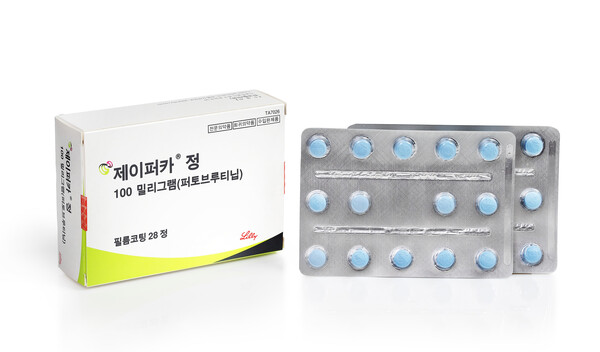
Lilly Korea said Monday that it launched Jaypirca Tablets 100 mg (pirtobrutinib) for treating relapsed or refractory mantle cell lymphoma.
Unlike previous generations, Jaypirca is a third-generation BTK inhibitor with a reversible BTK inhibition mechanism.
The first generation of BTK inhibitors is Imbruvica (ibrutinib from Johnson & Johnson), and the second generation includes Brukinsa (zanubrutinib from BeiGene), Calquence (acalabrutinib from AstraZeneca), and Velexbru (tirabrutinib from Ono Pharmaceuticals).
The U.S. Food and Drug Administration approved Jaypirca in August as a monotherapy for adult patients with relapsed or refractory mantle cell lymphoma (MCL) who have received two or more prior therapies, including a BTK inhibitor.
The phase 1/2 BRUIN study, which was the basis for approval, demonstrated an overall response rate (ORR) of 56.7 percent and a duration of response (DoR) of 17.6 months in the primary analysis set (PAS) of 90 patients who had received at least one prior BTK inhibitor.
The most common adverse events following treatment with Jaypirca were fatigue (26.3 percent), neutropenia (22.8 percent), diarrhea (22.1 percent), and contusion (19.0 percent). The frequency of treatment discontinuation due to AEs was 1.2 percent, and the frequency of dose reduction due to AEs was 3.3 percent.
“For MCL patients who have been unable to continue appropriate treatment due to a lack of alternatives after failing to see an improvement in their condition following conventional therapy, the launch of Jaypirca is a milestone in expanding treatment possibilities,” said Kwon Mi-ra, executive vice president of Lilly Korea's Anti-Cancer Business Division.
Jaypirca also passed its first reimbursement hurdle, passing the Health Insurance Review and Assessment Service's Cancer Disease Review Committee on April 18. The drug will be reviewed by the Pharmaceutical Reimbursement Review Committee, negotiated with the National Health Insurance Service, and voted on by the Health Insurance Policy Review Committee.

